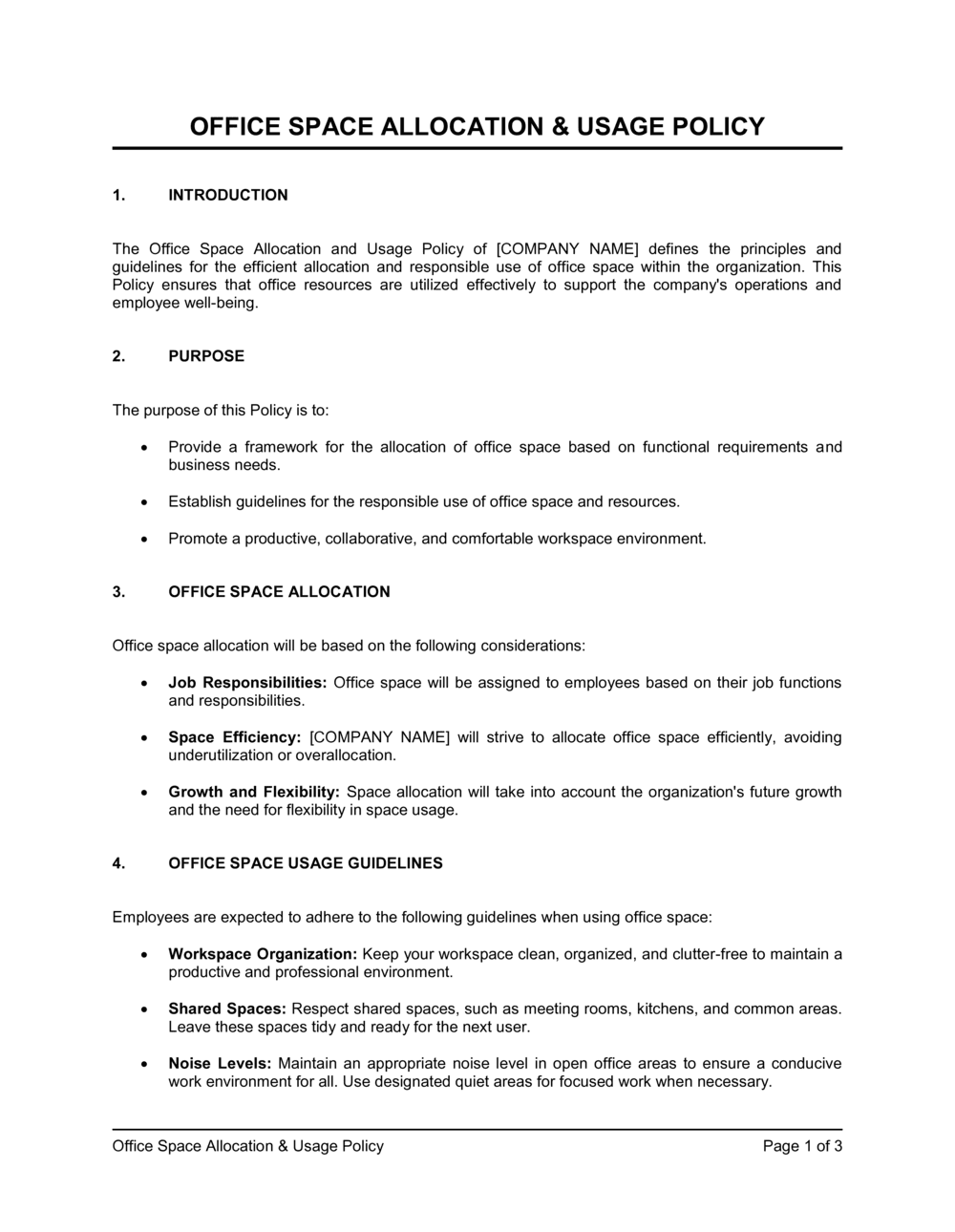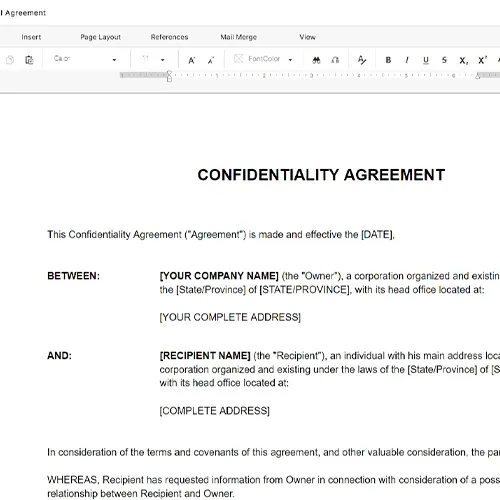Office Space Allocation and Usage Policy Template

Document content
This office space allocation and usage policy template has 3 pages and is a MS Word file type listed under our human resources documents.
Sample of our office space allocation and usage policy template:
OFFICE SPACE ALLOCATION & USAGE POLICY INTRODUCTION The Office Space Allocation and Usage Policy of [COMPANY NAME] defines the principles and guidelines for the efficient allocation and responsible use of office space within the organization. This Policy ensures that office resources are utilized effectively to support the company's operations and employee well-being. PURPOSE The purpose of this Policy is to: Provide a framework for the allocation of office space based on functional requirements and business needs. Establish guidelines for the responsible use of office space and resources. Promote a productive, collaborative, and comfortable workspace environment. OFFICE SPACE ALLOCATION Office space allocation will be based on the following considerations: Job Responsibilities: Office space will be assigned to employees based on their job functions and responsibilities. Space Efficiency: [COMPANY NAME] will strive to allocate office space efficiently, avoiding underutilization or overallocation. Growth and Flexibility: Space allocation will take into account the organization's future growth and the need for flexibility in space usage. OFFICE SPACE USAGE GUIDELINES Employees are expected to adhere to the following guidelines when using office space: Workspace Organization: Keep your workspace clean, organized, and clutter-free to maintain a productive and professional environment. Shared Spaces: Respect shared spaces, such as meeting rooms, kitchens, and common areas. Leave these spaces tidy and ready for the next user. Noise Levels: Maintain an appropriate noise level in open office areas to ensure a conducive work environment for all. Use designated quiet areas for focused work when necessary. Equipment and Resources: Use office equipment and resources responsibly and report any malfunctions or damage promptly to the appropriate department. Personalization: While personalization of workspaces is encouraged, it should not disrupt or infringe upon the rights of others. Avoid excessive personal decorations that may create a distracting or unprofessional atmosphere. Energy Efficiency: Contribute to energy conservation efforts by turning off lights and electronic devices when not in use. Security: Ensure the security of office spaces by locking doors and securing valuable items when leaving your workspace. OFFICE SPACE SHARING Shared workspace arrangements are introduced to optimize the utilization of office space, improve collaboration, and enhance resource efficiency. In this context: Optimizing Space Usage: Shared workspaces may include hot-desking, hoteling, or communal work areas
3,000+ Templates & Tools to Help You Start, Run & Grow Your Business

Document content
This office space allocation and usage policy template has 3 pages and is a MS Word file type listed under our human resources documents.
Sample of our office space allocation and usage policy template:
OFFICE SPACE ALLOCATION & USAGE POLICY INTRODUCTION The Office Space Allocation and Usage Policy of [COMPANY NAME] defines the principles and guidelines for the efficient allocation and responsible use of office space within the organization. This Policy ensures that office resources are utilized effectively to support the company's operations and employee well-being. PURPOSE The purpose of this Policy is to: Provide a framework for the allocation of office space based on functional requirements and business needs. Establish guidelines for the responsible use of office space and resources. Promote a productive, collaborative, and comfortable workspace environment. OFFICE SPACE ALLOCATION Office space allocation will be based on the following considerations: Job Responsibilities: Office space will be assigned to employees based on their job functions and responsibilities. Space Efficiency: [COMPANY NAME] will strive to allocate office space efficiently, avoiding underutilization or overallocation. Growth and Flexibility: Space allocation will take into account the organization's future growth and the need for flexibility in space usage. OFFICE SPACE USAGE GUIDELINES Employees are expected to adhere to the following guidelines when using office space: Workspace Organization: Keep your workspace clean, organized, and clutter-free to maintain a productive and professional environment. Shared Spaces: Respect shared spaces, such as meeting rooms, kitchens, and common areas. Leave these spaces tidy and ready for the next user. Noise Levels: Maintain an appropriate noise level in open office areas to ensure a conducive work environment for all. Use designated quiet areas for focused work when necessary. Equipment and Resources: Use office equipment and resources responsibly and report any malfunctions or damage promptly to the appropriate department. Personalization: While personalization of workspaces is encouraged, it should not disrupt or infringe upon the rights of others. Avoid excessive personal decorations that may create a distracting or unprofessional atmosphere. Energy Efficiency: Contribute to energy conservation efforts by turning off lights and electronic devices when not in use. Security: Ensure the security of office spaces by locking doors and securing valuable items when leaving your workspace. OFFICE SPACE SHARING Shared workspace arrangements are introduced to optimize the utilization of office space, improve collaboration, and enhance resource efficiency. In this context: Optimizing Space Usage: Shared workspaces may include hot-desking, hoteling, or communal work areas
Easily Create Any Business Document You Need in Minutes.

Access over 3,000+ business and legal templates for any business task, project or initiative.

Customize your ready-made business document template and save it in the cloud.

Share your files and folders with your team. Create a space of seamless collaboration.
Templates and Tools to Manage Every Aspect of Your Business.
Business in a Box Covers Every Business Department
Includes 16 Types of Business Documents You Need
and Achieve Your Business Goals Faster.
